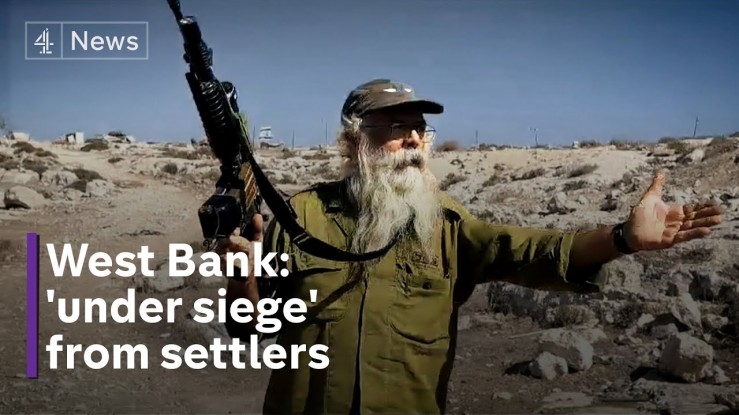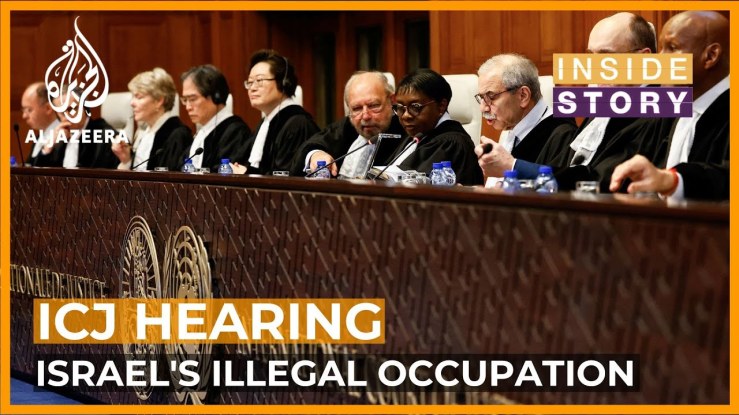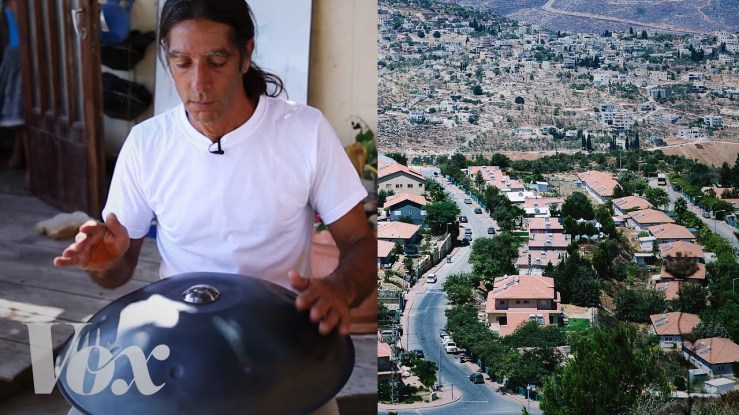An intimate look at life inside the
Jewish settlements in the West Bank
Zionists accuse their critics of antisemitism. According to them, anti-Zionism amounts to a denial of the right of Jews for self-determination. Well, it all depends on the conditions and circumstances of the self-determination. If it involves unlawfully occupying and stealing the land of other people, yes, it must be criticized. Self-determination cannot cost the extermination of others. What happened to the motto “A land without a people for a people without a land”? Was Palestine a land without a people?
The Settlers is a 2016 Israeli documentary film directed by Shimon Dotan. The film takes a critical look at the Israeli settlements in the West Bank.


“What happens when the prophecy promises something very concrete, while the facts indicate that it won’t be fulfilled? Contrary to what we would expect, people don’t lose faith. They find a way to explain what happened. They try even harder to attain the redemption that was promised and didn’t come to pass. The Messianic drive gets stronger when the prophecy fails.”
Tomer Persico, Professor of Jewish and Israel Studies, Tel Aviv University (The Settlers, 2016)
Joshua’s 3 options
Yehuda Etzion, one of the founders of the extremist settler movement Gush Emunim, explains Joshua’s three options. His special esteem for the enemy who refuses to make peace and refuses to leave, prefering to wage war (the third and last option), reminds us of Nietzsche’s philosophy of enmity.

We welcome anyone who wants to make peace with us, but he must renounce his political aspirations. He will be a guest in our midst, call it a “resident alien”, the definition doesn’t matter. We will treat him fairly as a private individual, in terms of employment, livelihood, etc., but he will have no political rights. That’s the first option. The second option is, if someone doesn’t want peace, we show him the way out. If he wants to wage war, so be it. If he doesn’t want to live in peace and doesn’t want to leave… I, for one, just between us, respect him much more for choosing the third option. I prefer someone who sticks to his principles like a man. I respect the enemy, but he’s the enemy and we must fight him.
Yehuda Etzion, co-founder of the Gush Emunim movement
‘I love the smell of apartheid
in the morning’

“If it smells like Apartheid, looks like Apartheid, sounds like Apartheid, then it’s Apartheid.”
Critical Review
According to Jordan Hoffman, who reviewed The Settlers for an Israeli mainstream newspaper, the documentary is “an effective work of left-wing propaganda” (The Times of Israel, March 3, 2017). Maybe because it exposes the racist and hateful aspects of the Zionist endeavour?
Hoffman writes: “There is a lot in The Settlers that shows how Israel’s religious right-wing treats Palestinians as subhumans with no rights. This is deplorable and must be exposed. But almost every settler we meet in this movie is a zealot, a scumbag or a wacko. Good luck finding a struggling middle-class family unable to find an economically viable home who would gladly pack up the minute either government comes correct with a substantial peace plan. (I’ve met them, they exist.)”.

A Zionist settler is asked the question: “Don’t you care that you’ll be called a racist?” His prompt answer is downright disturbing. In a nonchalant manner, the settler flaunts a rhetoric of candid racism, intolerance, and hatred for the non-Jew (the ‘Gentile’) as such (a fortiori the Arab): “I am a racist. Every morning I recite the prayer: ‘Thank you, God, for not creating me a Gentile.’ I’ll stop for a Jewish hitchhiker and not an Arab, because I’m a racist. I’ll only hire Jews, not Arabs, because I’m a racist. I won’t give charity to an Arab woman because I’m a racist.”
Another way to recite that prayer is: “Thank you, God, for creating me a racist.” In any case, one should not generalize and take this particular example as representative of the whole or the majority. Now, if Zionism is racist, being anti-Zionist is being anti-racist: a Kantian categorical imperative to be universalized. However, the claim that Zionism is a racist ideology does not imply that all Israelis are racists, see themselves as such, or even approve of racism. Many Jews who went to Eretz Yisrael after 1948 don’t even consider themselves actively Zionists. So, if Judaism is not inherently racist, let alone supremacist, what is it that makes the settlers depicted in the film so monstruously racist, so radically supremacist that they would make the KKK blush? The answer can only be: Zionism.
Shimon Palmer, another young settler featured in the film, is asked if he considers himself a Zionist. “A Zionist? No”, he replies, as if he had nothing to do with Zionism, and vice-versa. The director then asks: “So, why are you here?” “This is where I belong. My strange life led me here. I am very connected to this place. I love this land, this is my little corner of the world.”
If probed a bit further about his romantic claim of “belonging” and “connectedness,” if the interlocutor asked “says who?” or “who/what proves you belong here and this land is yours?”, the answer would most likely be (even if the Zionist settler is secular and non-religious): “God said so. It’s written in the Torah. God gave this land to us…”
Like a deus ex-machina, it is called for only to present our divinely granted real-estate titles (other than that He’s useless, obsolete). They claim the land belonged to their ancestors, but their ancestors left the land millennia ago in diaspora, as it was God’s will (it always is), and spread all over the world. And even after millennia in diaspora, it’s still their “promised land,” has always been, will always be, judging by the Zionists’ beliefs (even the atheists among them share this belief). Therefore, they can just “take it back” whenever they feel like. Or when they say “God,” do they mean Lord Balfour?

Furthermore, the indifference to or rejection of Zionism, coming from someone who went to Israel as a settler thanks to the fulfillment of the Zionist “prophecy” (or British colonialism), is quite symptomatic in terms of a cognitive dissociation between language and reality, symbolic representation and concrete experience. Such a symptomatic denial seems to confirm the (tricky) feature of hegemonic ideology that enables it to shape people’s minds, speak through their voices and command their actions without them acknowledging or even realizing it, in a subtle, insidious way. Ideology aspires to ubiquity; it conceals itself underneath the deceitful cloak of “neutrality,” “normality,” ”reality,” disguising itself as “the way things are”, thus normalizing what is not normal, naturalizing what is not natural, justifying and legitimizing what would be otherwise unjustifiable and unacceptable.
“We hear a lot about the Zionist ideology and the idea that the land of Palestine is the land of Israel. Whenever you hear it, imagine if someone came to you the dead of night in London and said: I used to live in your house 2.000 years ago and, because of that, the house belongs to me. And the next day they come with the police who says: They have a right, you have to give them half of their house.”
Ilan Pappé, Intelligence Squared debate: “Is anti-Zionism anti-semitism?” (June, 2019)
THE DIRECTOR:

Shimon Dotan (Hebrew: שמעון דותן; born 23 December 1949) is an Israeli film director, screenwriter, and producer. He was born in Aiud, Romania, in 1949, and moved to Israel in 1959. He grew up in Moshav Arugot, an agricultural cooperative. He then served five years in the Israeli military as a Navy Seal and went on to get his BFA at Tel Aviv University, where his student films won Israel’s Best Short Film and Best Director Awards twice.






















[…] who recite the prayer: “Thank you, God, for creating me a racist” (see The Settlers documentary). Judging by this paradoxical perspective, it’s perfectly possible to hate in good faith, to […]
CurtirCurtir
[…] Zionist settler featured in the documentary The Settlers (2016) is asked the question: “Don’t you care that you’ll be called a racist?” His prompt […]
CurtirCurtir
[…] the Israeli population. Like the Zionist settlers depicted in Shimon Dotan’s documentary The Settlers (2016), May Golan claims to be “a proud […]
CurtirCurtir
[…] Cinema & TV […]
CurtirCurtir